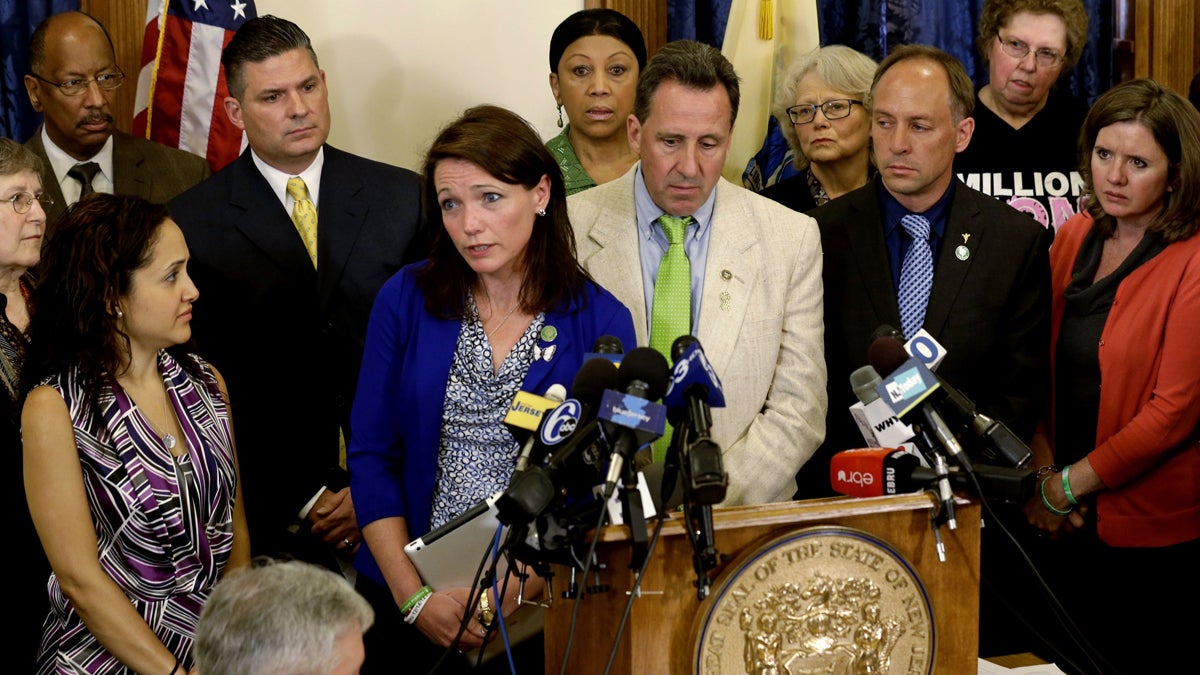Sandy Hook parents promote mental health measure amid federal impasse
Listen
Nicole Hockley
Dylan Hockley was just 6 when he and 25 others were killed at Sandy Hook Elementary School on Dec. 14, 2012.
His mother, Nicole Hockley, says Dylan was a bundle of joy who loved watching Disney movies like “Tangled” and playing with his older brother, Jake.
“He was mischievous and he had a laugh that was incredibly infectious,” she said during an interview last week. “People honestly used to tickle him just to hear him laugh.”
And Dylan loved his chocolate.
“After every meal, he had to have four squares of Hershey chocolate. That was his treat. He knew exactly where the bars were in the cupboard. And as long as he ate enough of his food, he could have his squares of chocolate,” she said. “And that was important to him.”
In the aftermath of the shooting, Nicole Hockley joined the Sandy Hook Promise Foundation, a group led by victims’ families that campaigns for legislative reforms.
She recently traveled to Allentown, Pennsylvania, to kick off a national tour promoting a federal bill that seeks to curb gun violence by improving mental health.
The event, organized by Philadelphia-based nonprofit CeaseFirePA, featured speeches by Allentown Mayor Ed Pawlowski, Lehigh County Executive Tom Muller and Allentown Police Chief Joel Fitzgerald, who all endorsed the measure.
The Promoting Healthy Minds for Safer Communities Act, or H.R. 4783, seeks to strengthen current mental health policy.
“We really feel that this is an important bill to reduce and prevent gun violence through improving intervention and prevention and giving both community-based and law-enforcement tools to help more readily identify and deal with mental health and behavior issues,” said Hockley.
The bill calls for expanding restrictions on firearms purchases to include those involuntarily committed to out-patient mental health treatment. Current federal law has been interpreted to apply only to inpatient care. It would also prevent those convicted of stalking or domestic abuse from purchasing firearms.
U.S. Rep. Mike Thompson, D-California, is the primary sponsor and chairs the House Gun Prevention Task Force. Another benefit of the measure, he said, is that it would give law enforcement greater authority to seize guns from those deemed threats to public safety.
“The bill provides grants to states so they can create laws that allow law enforcement to get a warrant and remove guns from people who are a danger to themselves or others,” Thompson said.
NRA, gun owners groups oppose measure
The measure is unlikely to be voted on before November’s midterm elections, he said, citing strong opposition from the National Rifle Association.
The NRA, which declined an interview request, issued a statement saying Thompson’s bill is not a serious attempt at mental health reform.
“It is a gun-control bill that pursues a tired formula of categorical bans and taxpayer-funded political surveys and studies,” said a representative in an e-mail.
And the NRA isn’t alone in that sentiment.
Kim Stolfer is president of Firearms Owners Against Crime, a political action committee in Pittsburgh.
The Healthy Minds Act does little to promote mental wellness, he said, but does plenty to stifle constitutional rights. Seizing guns, even when approved by a judge, is a clear violation of those rights, Stolfer said.
“It expands the intrusiveness of government. It limits an individual’s due process rights. And it is, in general, just a way of tightening the noose on law-abiding citizens without having any impact on any of the mass murders that have been committed by individuals with firearms,” he said.
Stolfer suggested increasing funding for mental health facilities instead.
“Government has got to take and examine why we don’t have adequate facilities to treat these mentally ill people,” he said. “That has to be looked at, and these grant programs they’re talking about is not going to do it.”
But Nicole Hockley said this one bill won’t be the only way Sandy Hook Promise tries to reduce gun violence. The group’s coast-to-coast tour will feature discussions with numerous politicians about many different initiatives.
Since Sandy Hook, politicians have yet to enact any real change, she said.
“Over the last 18 months, there’s been a lot of talk at a federal level for gun safety and mental health initiatives — but in terms of any tangible changes, that’s really stalled federally,” she said.
And the legislative battles will continue, not just federally but in individual states.
In Pennsylvania, Sandy Hook Promise plans to lobby for restrictions on firearm magazines and universal background checks for all types of gun buyers, while groups such as the NRA and Firearms Owners Against Crime stand ready to oppose them.
WHYY is your source for fact-based, in-depth journalism and information. As a nonprofit organization, we rely on financial support from readers like you. Please give today.

